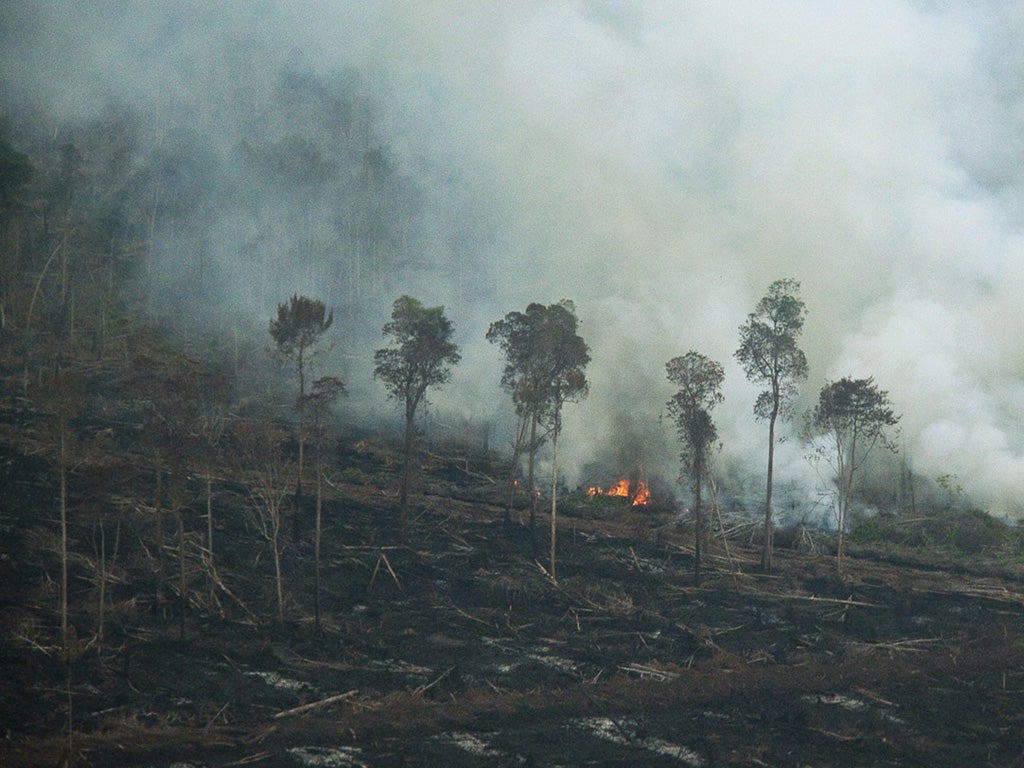Protecting world’s tropical peatlands could help ‘stop the spread of new diseases’
Conserving carbon-rich peatlands could also be key to tackling climate crisis, says review

Your support helps us to tell the story
From reproductive rights to climate change to Big Tech, The Independent is on the ground when the story is developing. Whether it's investigating the financials of Elon Musk's pro-Trump PAC or producing our latest documentary, 'The A Word', which shines a light on the American women fighting for reproductive rights, we know how important it is to parse out the facts from the messaging.
At such a critical moment in US history, we need reporters on the ground. Your donation allows us to keep sending journalists to speak to both sides of the story.
The Independent is trusted by Americans across the entire political spectrum. And unlike many other quality news outlets, we choose not to lock Americans out of our reporting and analysis with paywalls. We believe quality journalism should be available to everyone, paid for by those who can afford it.
Your support makes all the difference.Protecting the world’s remaining tropical peatlands could help to curb the risk of new diseases passing from wildlife to humans, according to a new scientific review.
Conserving tropical peatlands will also be key to tackling the climate crisis, the review says. This is because peatlands store vast amounts of carbon in their swampy, water-logged soils.
Across the world, peatlands cover just 3 per cent of the land’s surface, but store one-third of the Earth’s soil carbon.
Protecting the world’s swampy rainforests would also help to conserve a huge diversity of threatened wildlife, ranging from orangutans in Indonesia to lowland gorillas and forest elephants in the Congo Basin.
“Tropical peatlands, and disturbance of these ecosystems and their wildlife, are relevant in the context of public health and disease pandemics, which strengthens the argument for their conservation and restoration,” Dr Mark Harrison, a research fellow in ecology and conservation at the University of Exeter, told The Independent. Dr Harrison is the lead author of the new scientific review, published in the journal PeerJ.
“The benefits of tropical peatlands in terms of wildlife conservation, carbon emissions and provision of resources to local communities are widely appreciated... but ours is the first study we are aware of that explicitly draws and investigates these links between tropical peatlands and emerging infectious diseases.”
Tropical peatlands are home to many animals that are known to pose a disease risk to humans, including bats, rodents, pangolins and primates, according to the review.
Protecting the habitat of these species would reduce their contact with people, reducing the risk of disease spread, it added.
Emerging infectious diseases that pass from wildlife to humans are receiving renewed scientific focus in light of the Covid-19 pandemic.
Though the origins of Covid-19 are not yet clear, scientists suspect the virus passed from bats to humans through an unknown intermediary animal, possibly a pangolin.
When humans come into contact with wildlife, they can pass harmful pathogens between one another. The passing of an infection or disease from a vertebrate animal, such as a mammal or bird, to a human is known as a “zoonosis”, according to the World Health Organisation (WHO).
Zoonotic diseases have a major impact on human health, accounting for two-thirds of all human infectious diseases and three out of four newly emerging diseases.
A report produced by the world’s leading biodiversity experts in October warned that the current rate of destruction of natural habitats will lead to more pandemics if not curbed.
The report by the Intergovernmental Science-Policy Platform on Biodiversity and Ecosystem Services (IPBES) said that future pandemics will “emerge more often, spread more rapidly, do more damage to the world economy and kill more people than Covid-19 unless there is a transformative change in the global approach to dealing with infectious diseases”.
The new review highlights that conserving and restoring tropical peatlands should be part of this “transformative change”, said Dr Harrisson.
“We highlight that we don't consider tropical peatlands to be exceptionally or unusually risky from an emerging infectious disease perspective compared to other tropical habitats, but rather note that the evidence suggests there is a risk and that this risk will be reduced through protection and restoration of these ecosystems and their wildlife,” added Dr Harrisson.
At present, tropical peatlands are being lost at an alarming rate, said Dr Harrison.
The rate of loss has been particularly high in Indonesia, where peatlands are routinely deforested and drained to make way for palm oil plantations.
Indonesia cleared an average of 498,000 hectares of forest each year from 2000 to 2015 – making it the world’s second largest deforester after Brazil.
The practice of peatland draining in Indonesia is also linked to the spread of devastating fires, which also cause large amounts of greenhouse gases to be released into the atmosphere.
“Although the tropical peatlands of Africa and South America have suffered less degradation to date, these regions are not immune to these threats and they are at risk of further degradation in future,” said Dr Harrison.

Join our commenting forum
Join thought-provoking conversations, follow other Independent readers and see their replies
Comments